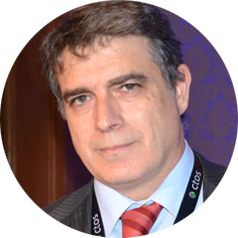Javier Martín-Broto
Research Activity Intensification Grant


November 21, 2022
"Academic research within multicenter and multidisciplinary consortia, such as PANTHR-S, is the most effective way to advance in the field of rare diseases such as sarcomas."
Dr. Javier Martín-Broto, graduated in medicine from the University of Zaragoza in 1988, obtained his specialty in medical oncology in 1994 and his doctorate in molecular biology in 2010. Since 1995, he has focused his clinical activity exclusively on the care of patients diagnosed with sarcoma at Son Dureta and Son Espases Hospitals (Mallorca) and at the Virgen del Rocío University Hospital (Sevilla), contributing to the latter’s accreditation as a National Health Service (NHS) reference center for sarcomas (CSUR) and as a European reference center within the EURACAN network in 2017.
Dr. Martín is a founding member of the Spanish Sarcoma Research Group (GEIS), a member of the American Society of Clinical Oncology (ASCO), the European Society for Medical Oncology (ESMO), the Connective Tissue Oncology Society (CTOS), where he served as Director between 2014 and 2018, and the Spanish Society of Medical Oncology (SEOM). He is also part of the Steering Committee of the European Reference Network on Rare Adult Cancers (EURACAN) and has contributed to various international consortia (FOSTER, EUROEWING, BLUEBERRY), highlighting his leadership in the SELNET consortium (which involves European and Latin American countries) and the IDEA4RC project funded by the Horizon Europe program of the European Commission.
Since the beginning of his professional career, Dr. Martín-Broto has combined clinical, academic, and research activities (clinical, preclinical, and translational). Since 2019, he has been responsible for and coordinator of the Sarcoma Unit at the 4H Quirónsalud Hospitals network (Hospital General de Villalba, Hospital Universitario Fundación Jiménez Díaz, Hospital Universitario Rey Juan Carlos, and Hospital Universitario Infanta Elena). He also participates in undergraduate teaching at the Universidad Autónoma de Madrid and the Universidad Alfonso X el Sabio, and in the Master's program in Musculoskeletal Tumors at the Universidad Europea de Madrid, as well as in the teaching of medical oncology residents. Additionally, he is the head of the preclinical and translational research group at the Molecular Biology Laboratory ATBSARC, affiliated with the Fundación Jiménez Díaz Health Research Institute (IIS-FJD).
Project Summary and Importance for Clinical Practice
Project: Improving Neoadjuvant Therapy in High‐Risk Sarcomas.
Soft tissue sarcomas (STS) comprise a broad group of uncommon tumors characterized by the need for multidisciplinary management and treatment. In certain subtypes, when the disease is localized in the trunk wall or extremities, neoadjuvant chemotherapy (NAC) administered before surgery can increase cure rates and reduce the risk of relapse. Although recommended for high-risk populations, not all patients benefit equally. Given the complexity and heterogeneity of STS, delving into their clinical and molecular characteristics could optimize the selection of these patients.
The project "PANTHR-S: Precision Medicine Approaches for Neoadjuvant Therapy in High-Risk Sarcoma Patients" aims to analyze clinical, radiological, pathological, and molecular data using powerful computational tools and generate animal models from tumor samples, with the goal of conducting NAC response studies and identifying prognostic factors and potential new therapeutic targets. This is a multicenter European collaborative project, involving other leading preclinical research groups from the United Kingdom and Italy.
Specifically, Dr. Martín-Broto's research group leads the transcriptomic analysis of samples from patients diagnosed with sarcoma, which will be carried out at the ATBSARC molecular biology laboratory. Additionally, the group will participate in the generation of patient-derived models (PDXs), in the in vivo studies of these models, and in the design of the platform and data collection process.
As Dr. Martín-Broto himself states, "This project aims to expand knowledge in this uncommon and heterogeneous set of tumors, helping to provide more personalized patient management and identify new treatment options."




